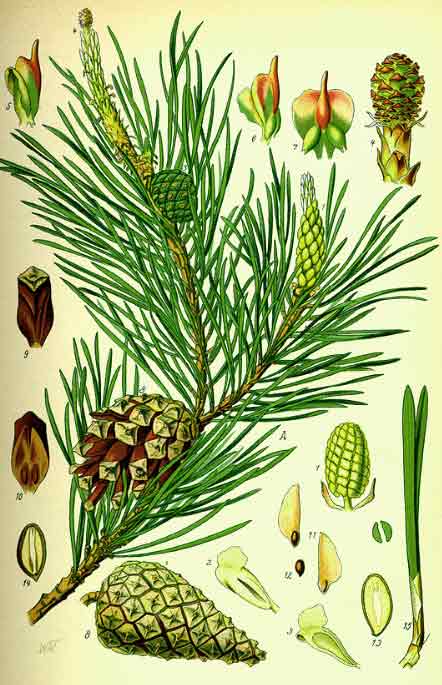Pine in herbal medicine and aromatherapy
Pine essential oil has a sharp, fresh, and clean scent. Pine essential oil is distilled from the needles and resin of several varieties of pine trees.

Scotch pine (Pinus Sylvestris) oil is recommended for use in aromatherapy and other herbal remedies. Poor quality pine oils lack sweetness and have a harsh aroma like turpentine.
Pine essential oil is a powerful antiseptic that fights chest congestion and lung problems. The scent is refreshing and energizing.
Pine essential oil is used as a herbal remedy and in aromatherapy.
Pine essential oil is used in the treatment of skin conditions like eczema, psoriasis, athlete's foot, cuts, scabies, and sores.
In aromatherapy, pine essential oil is used to refresh a tired mind and soothe mental stress. Pine essential oil is used externally. Do not take it by mouth or use it internally!

Pine essential oil can be both warming and cooling.
Pine essential oil is good for helping to fight fatigue and nervous exhaustion. It helps build strength, self confidence, and stamina.
The scent of pine brings about a sense of freedom and can be warming or cooling depending on the situation.
Pine essential oil is a useful home remedy.
Pine essential oil reduces inflammation of the gallbladder when used in compresses and poultices.
It may also be used as an inhalant for infections of the respiratory tract.
Pine essential oil is used in the treatment of everything from pneumonia to stuffy noses. It is a powerful antiseptic and can kill many harmful microbes.
Pine essential oil can help the kidneys and adrenal glands.
The scent of pine essential oil is good for the kidneys, adrenal glands, prostate, and reproductive organs. It is often used in the treatment of hepatitis.
Women suffering from menopausal hot flashes and night sweats can benefit from the use of pine oil since it can reduce profuse sweating.
Pine essential oil helps lots of things.
Pine essential oil can relieve rheumatism, neuralgia, anxiety, digestive problems, allergies, sciatica, gout, muscle pain, and arthritis. It also stimulates circulation.
Pine essential oil is a good addition to muscle rubs and massage oils, but may cause irritation if used on sensitive skin. Always test any new lotion or massage blend on a small area of skin before using on large areas of the body.
Never use pine essential oil on the skin without diluting with a good carrier oil like almond or olive.
In extreme situations, adding Scotch pine to the diet can prevent scurvy.
Native Americans were known to use Scotch pine to prevent scurvy. They ate the twigs!
Native Americans also used Scotch pine to keep away fleas, ticks, and other insects.
Pine oil can restore health after a prolonged illness.
Pine forests are known to be healing since the essential oil evaporates from the pine needles.
Campers should be on the lookout for a nice bed of pine needles when they pitch their tents. They will wake up refreshed and energized.

Pine essential oil blends well with other essential oils.
Pine essential oil is added to many household products such as cleansers, deodorants, and soaps.
It blends well with bergamot, cedarwood, clary sage, cypress, eucalyptus, frankincense, grapefruit, juniper, lavender, lemon, marjoram, peppermint, rosemary, sandalwood, tea tree, and thyme essential oils.
Pycnogenol for health and longevity
Pine essential oil is full of flavonoids, phenolic acids, and a substance known as Pycnogenol.
Pycnogenol is a standardized bark extract from Pinus maritima. It is useful for treating chronic inflammation and circulatory problems.
Pycnogenol is also good for protecting against alcohol related liver disease and the problems that come with aging.
*Pine essential oil should not be used in cases of high blood pressure. It should not be used when treating babies, small children, pregnant women, or the elderly. Some pine oils are toxic, especially dwarf pine (pinus pumilio).
Keep all essential oils away from the eyes. Do not take essential oils internally without consulting a qualified health professional. Always dilute essential oils with good carrier oil and test on small area of skin before use.
Always consult with a healthcare professional before using any herbal remedy especially if pregnant, nursing, or taking other medicines.
Sources:
https://www.ncbi.nlm.nih.gov/pmc/articles/PMC7827367/
Blessings to you and yours!
Thanks so much for reading my blog. Jan.

*Note - the information on this website has not been evaluated by the Food and Drug Administration.
© 2005-2024 website design and content by Janice Boling